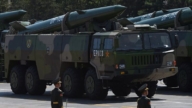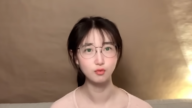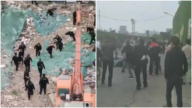【新唐人2014年01月24日讯】北京当局22号召开了“全面深化改革小组”的第一次会议,相对于官方媒体热炒的情形,各界人士如何看待这个小组呢?本台记者唐音23号采访了旅美历史学家余英时、及“中国民主党”创始人之一——陈忠和,还有《新唐人》时事评论员蓝述。让我们一起去看看他们怎么说。
中共国家主席习近平,22号主持了“全面深化改革领导小组”的第一次会议。据官方报导,这个小组分为经济体制、政治体制、文化体制、社会体制、生态文明体制和中共党务制度这六个专项小组。小组的主要工作是统筹、制定方案、检查落实和调研。
84岁高龄的旅美历史学家余英时,观察中共几十年来的施政表现。他认为,这个小组要推行的所谓“改革”,非常空洞、没有意义。
旅美历史学家余英时:“(笑)没什么含义,它就是敷衍一下,用些很空洞的话来应付一下。因为你看它现在所作所为绝对不可能有什么改革可言。那都是废话。把贫富不均搞清楚,把市场开放了,要把压迫言论自由取消了。人权不肯放松,那还谈什么呢?”
在所谓“全面深化改革小组”出炉的同一天,22号,北京第一中级法院开庭审理“公盟”组织发起人之一的,大陆法律学者许志永案。许志永和他的辩护律师张庆方,以沉默抗议法庭执法违法。而庭外大量要求无罪释放许志永的民众,也遭到警方抓捕。
23号,大陆各大媒体热炒“全面深化改革小组”的公报。微博上、和各级官方媒体及国有单位,纷纷转载这一消息,不过,跟贴的民众寥寥无几。“全面深化改革小组”也没有登上当天的综合热搜榜。
流亡欧洲的中国民主党创始人之一陈忠和:“没有用的,这根本不是主流问题。那主流问题就是要抛弃这个独裁专制才行,那才算是真正改革。它这都是修修补补,实际上都是在延长共产党独裁专制的寿命,所以说这些花架子没有用的。现在中国的主流民意是对共产党怎么革命的问题。”
去年11月,中共“十八届三中全会”上,通过有关“全面深化改革”的重大问题《决定》中,明确写有,改革要坚持马列主义、毛思想、邓理论、三代表等,以及“坚持党的领导”。
陈忠和:“因为现在它的核心价值就是独裁专制,这个独裁专制是不可侵犯的。谁侵犯了它独裁的统治,就是对它核心价值的侵犯。所以说,它这个改革是不可能的。”
《新唐人》时事评论员蓝述分析,中共推出的这个所谓“深化改革”,面临的重大阻力就是﹕他们内部不同的利益集团。
去年年底,大陆资深媒体人高瑜爆料,中共前政治局常委、政法委书记周永康已经被双规。海外媒体广泛跟踪报导,中共官方对此不置一词。有分析指出,因为中共高层对如何处理周永康,至今无法达成共识。原因是﹕中共前党魁江泽民作为公认的周永康的后台,必然反对周永康被公开审理,而只要求在党内处分周永康。
《新唐人》时事评论员蓝述:“那么很多东西就不公开了,那实际上起不到触动周永康背后江泽民和江系的利益集团。第二,周永康的案件直接牵扯到的江泽民本人和家人,那么这个小组敢不敢去动?如果它不敢,那所谓的深化改革就是一句空话。”
最近“国际调查记者联盟”获得由告密者提供的资料中,中共众多高官及其家属享有离岸账户。而观察家发现,其中没有江派官员。有分析指出,这是中共现任高层抓捕周永康后,江派集团利用国际媒体所做的一次反扑。
观察人士表示,所谓改革,只是中共内部权力和利益的再分配而已。中共自称改革进入“深水区”、要打“攻坚战”,民间只当作笑话来看。
采访编辑/唐音 后制/陈建铭
Comprehensively Deepening Reforms Meets With Cold Public Reaction
On January 22, Beijing authorities held the first meeting
of the “Group for Comprehensively Deepening Reforms”.
What has been the Chinese publics reaction
compared with coverage by official media?
On January 23, our reporter Tang Yin
interviewed China historian Yu Yingshi.
Our reporter also spoke to Chen Zhonghe,
co-founder of the “China Democracy Party”,
and NTD political commentator Lan Shu.
On January 22, Chinese President Xi Jinping
presided over the first meeting of the “Group
for Comprehensively Deepening Reforms.”
According to official coverage, the lead
group is divided into six special areas.
These are economy, environment, politics,
culture, social system, and Party structure.
The main work of this lead group is to
co-ordinate, plan, implement and investigate.
Yu Yingshi is a US-based China historian.
He believes the group implementing these
reforms is very empty and meaningless.
This analysis comes after 10 years of observation
of the Chinese Communist Party ‘s performance.
Yu Yingshi, China historian: “It has no meaning,
it is a perfunctory look with some empty words.
This is because it is absolutely
impossible to speak of reforms.
It’s all nonsense, with inequalities in wealth,
unopened market, and oppression of free expression.
How could they talk about reforms,
without improving human rights?
On the same day as the meeting of the “Group
for Comprehensively Deepening Reforms,”
Beijing First Intermediate People’s Court opened
a court session opened the case of Xu Zhiyong.
Xu Zhiyong is co-founder of the
Open Constitution Initiative NGO.
Xu Zhiyong, a Mainland legal scholar, and his lawyer
Zhang Fang, remained in silence during the hearing,
in protest against illegal law enforcement in the court.
People gathered outside the court to
support Xu ‘s release were arrested by police.
On January 23, state-controlled media
reported on the discussions of the reform group.
Microblogs, official media and state institutions have
reproduced this news, but few people posted comments.
This news was also not high on
the search term listing that day.
Chen Zhonghe, one of the founders of the
China Democracy Party, in exile in Europe:
“It ‘s useless because it is not a main issue.
The main reform is to abandon dictatorship.
They are actually trying to extend the life
of the Party dictatorship by patching it up.
The main public opinion is one of removing dictatorship.”
Last November, the CCP 18th Third Plenary Session
passed resolutions for comprehensively deepening reforms.
These clearly stated that the reforms must adhere to
Marxism-Leninism, Mao Zedong Thought, Deng Theory,
three representatives, and “upholding Party leadership”.
Chen Zhonghe: “This is because its core value is
dictatorship, and that it ‘s dictatorship is untouchable.
The invasion of dictatorship is equal
to the invasion of its core value.
So the reforms it suggests are impossible.”
NTD political commentator Lan Shu analyzed this
significant resistance to the deepening of reforms.
It is the different interest groups that exist internally.
At the end of last year, Gao Yu, a senior media person,
released information that Zhou Yongkang, former
Politburo Standing Committee member, and Secretary
of the Politics and Law Committee, has been detained.
This was widely reported by overseas media,
but Chinese official media did not cover the story.
Some analysts suggest this is because the Party leadership
hasn ‘t reached a consensus on how to deal with Zhou.
Zhou Yongkang was a member of a faction
headed by former CCP leader Jiang Zemin,
who must be opposing a public hearing.
Lan Shu, NTD political commentator:“They can ‘t
touch Jiang Zemin, nor the interests of his faction.
There are many things that are not disclosed.
Secondly, can this group touch Jiang Zemin
himself, or his family members, if they are
directly involved in Zhou Yongkang ‘s case?
If they dare not touch him, so-called
deepening reforms is just empty talk.”
Recently, the International Federation of Journalists
obtained information indicating that many CCP
officials, and their families, have offshore accounts.
The observers found that none of the
officials from Jiang ‘s faction are in this report.
Some analysts suggest this information was
released as part of a counterattack from the
Jiang faction, in retaliation to Zhou Yongkang ‘s arrest.
Observers said that so-called reforms are just
the re-distribution of internal power and interests.
The so-called “deep water” of reforms and the
“tough fight” are just humorous to Chinese people.
Interview & Edit/Tangyan Post-Production/Chenjianmin




























